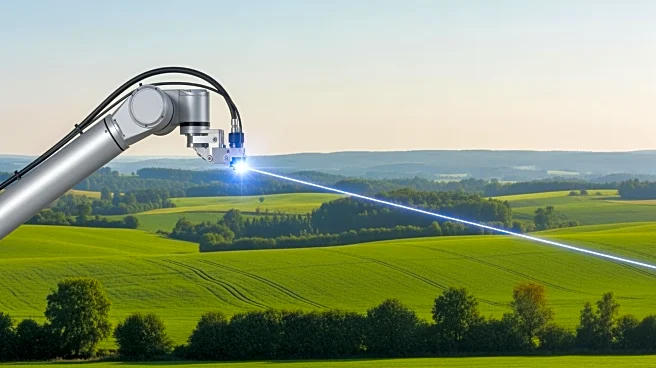What's Happening?
Terra Robotics, a Greek manufacturer, is set to deliver its innovative laser weeder in Europe starting early 2026. The machine, designed for non-chemical weed control, utilizes diode lasers to target and
eliminate weeds. The modular design includes multiple modules, each equipped with two lasers, and features prominent black hoses for laser cooling. The technology is capable of identifying various crops such as carrots, spinach, and onions, and can train algorithms to recognize other crops within a week. This development is part of a broader trend in the agricultural sector, where laser technology is increasingly being adopted for sustainable farming practices.
Why It's Important?
The introduction of Terra Robotics' laser weeder represents a significant advancement in sustainable agriculture, offering an alternative to chemical herbicides. This technology could benefit organic farmers by providing a method to control weeds without harming the environment. The ability to train algorithms for different crops enhances its versatility, potentially increasing its adoption across various farming operations. As the agricultural industry seeks to reduce chemical usage, innovations like this could play a crucial role in promoting eco-friendly farming practices and improving crop yields.
What's Next?
Terra Robotics plans to begin deliveries in Europe in early 2026, with expectations of expanding its market presence. The company has not disclosed pricing details, which could influence adoption rates. As the technology gains traction, other manufacturers may follow suit, leading to increased competition and further advancements in laser-based agricultural solutions. Stakeholders, including farmers and environmental groups, are likely to monitor the effectiveness and environmental impact of this technology closely.
Beyond the Headlines
The use of laser technology in agriculture raises questions about the long-term implications for farming practices and environmental sustainability. While it offers a non-chemical solution, the energy consumption and cost-effectiveness of such systems will be critical factors in determining their widespread adoption. Additionally, the integration of AI and machine learning in crop identification could lead to further innovations in precision farming.











